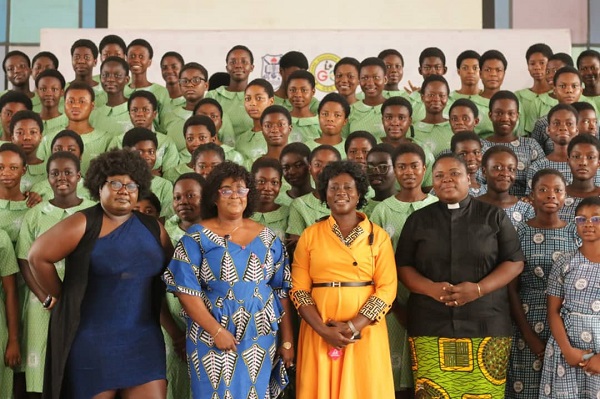About 3,500 students from the Yaa Asantewaa Girls Senior High School have benefited from a digital financial training programme meant to empower them with relevant skills for improved livelihoods, promote productive online engagement, combat cybercrime and support the government's efforts to reduce unemployment.
The training, organised in collaboration with the Women in Forex Ghana (WFG), is to offer digital financial literacy and skills to adequately prepare the students for better finance and career opportunities on the job market.
The initiative is made possible through the Elevate Ghana Forex Project (EGFP) to advocate for the need for exploration of the digital finance industry through training and mentorship, enlightening the youth about the enormous financial and career opportunities.
Towards that, the Women in Forex Ghana donated GH¢10,000 to support the school’s 65th anniversary celebrations scheduled for October this year.
First beneficiary
The Chief Executive Officer (CEO) of Women in Forex Ghana and head of the training project, Gifty Annor-Sika Asantewah, who is an old student of the school, stated that the Yaa Asantewaa Girls School was the first high school to benefit from the training and mentorship programme.
She said instilling the value of saving and investment in students at a young age can significantly impact their future financial decisions and liberation.
She said it was crucial to educate them early on, especially during these times of unemployment and pandemics, to empower them with the skills to make informed financial choices.
Ms Asantewah added that the digital finance training programme was aimed at empowering the youth with relevant skills for improved livelihoods, promoting productive online engagement, combating cybercrime and supporting the government's efforts to reduce unemployment.
Collaborative effort
The Headmistress of the school, Felicia Asamoah, commended the collaborative effort between the two parties for the digital finance programme meant to empower the students to gain relevant skills for the job market.
Mrs Asamoah said the students were being educated to be excellent in all facets of life, and for that reason, financial literacy could not be ruled out.
Address misconception
The Head of Academics at the school, Samuel Abosi, explained that the misconceptions surrounding forex trading and the digital finance industry often deter people from exploring its potential, hence the need for early education to debunk these myths and provide clarity.
He said introducing financial literacy training to students at an early stage gives them a significant edge in navigating the capital market, allowing them to confidently pursue career paths and financial opportunities in forex trading.
Context
The United Nations projects that Sub-Saharan Africa's population will double by 2050, with 60 per cent of its inhabitants currently under the age of 25, making it the world's youngest continent.
This rapidly growing youth population presents both opportunities and challenges for Africa's development.
Between 2018 and 2020, internet and digital engagement among African youth surged from 24.4 per cent to 90 per cent, according to ITU Digital World, yet much of their online activity remains unproductive despite the vast career and financial opportunities available online.
Africa's large youth population can drive growth and development if these young people are empowered, trained and enabled to reach their full potential.
To achieve this, it's crucial to involve the youth in decision-making processes and provide them with meaningful opportunities for employment, training and innovation.
The UN estimates that 16 million young Africans are currently unemployed, with 11 million entering the labour market annually while the continent generates only 3.7 million jobs each year, highlighting a significant gap that needs to be addressed.
